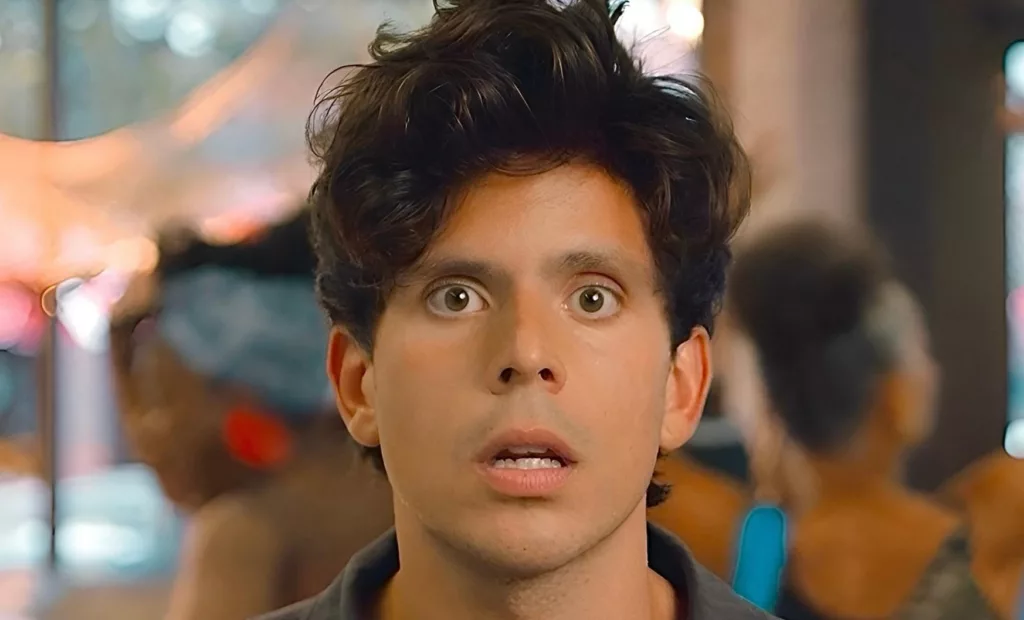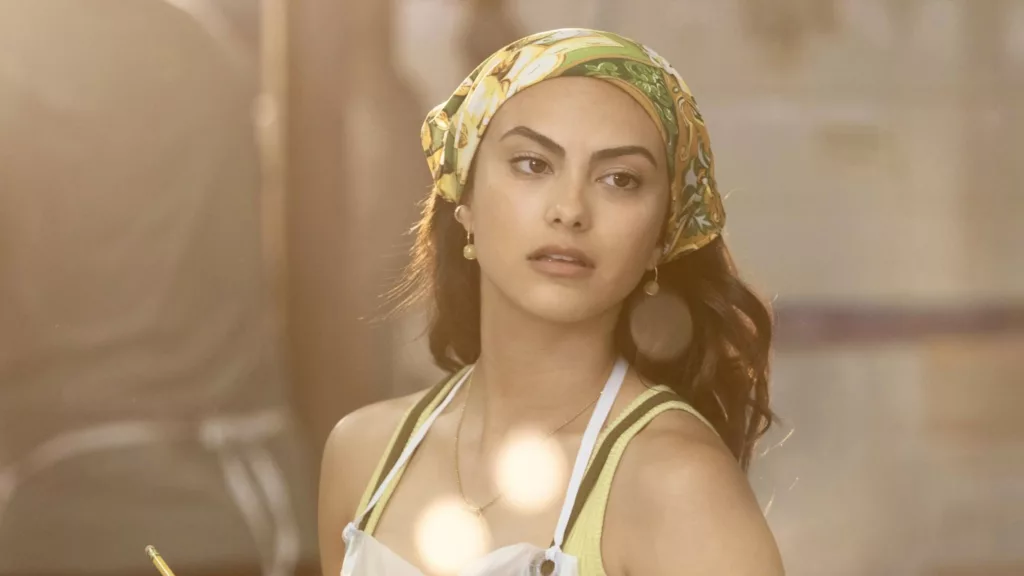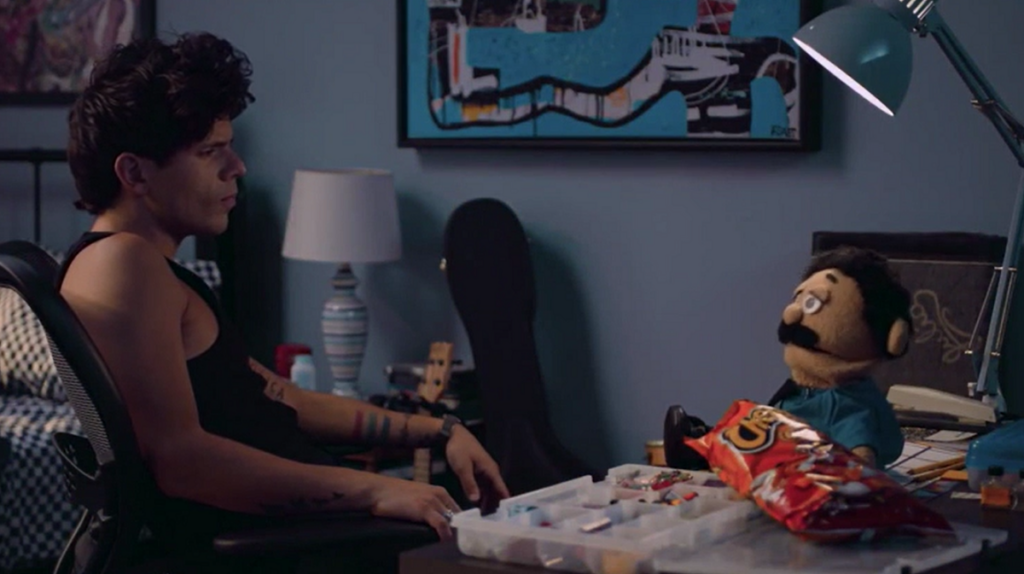In an era where the line between content creator and artist continues to blur, Rudy Mancuso emerges as a multi-talented voice demanding to be heard. His feature debut “Música” is a vibrant, semi-autobiographical musical rom-com that doubles as a unique and immersive window into synesthesia – the neurological phenomenon where one sense stimulates another.
At its core, the film charts familiar coming-of-age territory as Mancuso’s avatar Rudy, an aimless college student, finds himself torn between his watchful Brazilian mother’s wishes, his long-term girlfriend’s ambitions, and a free-spirited new love interest. However, what elevates “Música” is Mancuso’s multi-hyphenate role – he not only stars, but directs, co-writes, choreographs, and even composes the film’s melodic revelations born from the mundane sounds of everyday life.
It’s an undeniably personal artistic statement disguised as a charming romantic comedy. One made all the more compelling by Mancuso’s fearless embrace of his cultural roots and determination to shatter conventions. Like the rhythmic visions that cascade through Rudy’s mind, “Música” pulses with an infectious and inimitable creative energy.
Tropes Transcended
On its surface, “Música” adheres to the well-trodden blueprint of the romantic comedy genre. Rudy finds himself ensnared in a love triangle after his relationship with girlfriend Haley hits the rocks, leaving him torn between her comforting familiarity and the intoxicating possibility represented by the free-spirited Brazilian-American Isabella. Cue the farcical misunderstandings, cringe-inducing deceptions, and messy emotional fallout as our hapless hero tries fruitlessly to have his cake and eat it too.
And yet, within this fairly traditional premise, Mancuso manages to transcend the formulaic trappings through a deft blend of cultural authenticity and sly narrative subversions. The cookie-cutter rom-com construct is merely the Trojan horse to explore meatier thematic terrain – the generational tug-of-war between assimilation and preservation of one’s heritage, the struggle to forge an identity independent of parental expectations, and the universal journey of self-discovery and finding one’s purpose.
Rudy’s plight as the child of immigrant parents desperate for him to adopt a more conventional career path echoes experiences shared by countless multicultural families. His mother Maria, charmingly portrayed by Mancuso’s real-life parent, personifies the old-world values and cultural pride constantly at odds with Rudy’s aimless artistic yearnings – a battle made all the more poignant by their genuine maternal bond.
It’s within this authentically-rendered microcosm of the Brazilian-American diaspora experience that Mancuso upends romantic comedy contrivances. Instead of the stock quirky best friend, it’s Rudy’s very identity and synesthesia that serve as the destabilizing force, laying waste to traditional plot mechanics.
Newark’s vibrant Ironbound neighborhood isn’t just presented as kitschy set dressing, but as a cultural nexus where roots intermingle with dreams of mobility. By the climax, Isabella emerges not as another dimensionless love interest, but as an empowered, actualized woman embodying an ethos of hard-won self-acceptance – the very mind-frame Rudy still struggles to attain.
“Delve into the intimate and visceral exploration of womanhood with our Our Body review. Claire Simon’s documentary invites you into the private worlds of women at a Parisian hospital, revealing the stark realities of their lives.”
Performers In Harmony
At the center of “Música” is a revelatory turn by Rudy Mancuso himself as the synesthesia-afflicted Rudy. Imbuing the role with an understated charisma and winning vulnerability, Mancuso wholly avoids the overwritten quirks and ticks so often employed to convey neurodivergence on screen. Instead, he simply allows Rudy’s inner experience to organically radiate outward – his infectious creative passion, his struggle for direction, his all-too-human failings laid bare.
As the impetus for Rudy’s romantic waywardness, Camila Mendes exudes an earthy, lived-in allure as Isabella. Her palpable chemistry with Mancuso sells their whirlwind connection, while crucially investing Isabella with a strong sense of interiority. Here is no mere idealized love interest, but a fully-realized woman assured in her identity – a grounding counterpoint to Rudy’s untethered aimlessness.
The supporting cast shines just as brilliantly in their small but vital roles. J.B. Smoove is consistently hilarious as Rudy’s bestie Anwar, the fast-talking food truck philosopher spouting just enough wisdom between his terribly misguided romantic advice. And in a lovely bit of metatextual resonance, Maria Mancuso brings an authentically maternal mixture of tough love and tenderness as Rudy’s ever-worrying mom Maria.
Across the board, the ensemble imbues “Música” with an irresistible warmth and casual intimacy, as if we’re being absorbed into the bustling communal energy of Newark’s Ironbound district. These are not characters funneled through a Hollywood filter, but recognizable slices of life – their unbridled passions, simmering tensions, and messy complexities displayed in all their vibrant, specific splendor.
Senses Syncopated
While the narrative backbone of “Música” may be a fairly traditional romantic comedy, the way it audiovi sually renders the subjective experience of synesthesia is anything but conventional. This is where Mancuso and his creative team transcend the material, conjuring an ingenuity of formal technique that will leave audiences in a sustained state of wonder.
From the resounding opening notes, “Música” envelops us in Rudy’s unique neurodivergent perspective through a masterful fusion of sound design, editing, cinematography, and scoring. The soundscape seamlessly intermingles diegetic noises like the squeak of shoes on hardwood or the percussive thump of a basketball with lush orchestral arrangements. Texture, timbre and rhythm coalesce into a symphonic expression of Rudy’s inner self.
Standout set pieces like the breathtaking park sequence showcase this transcendent approach at its most audacious and immersive. As Rudy introduces Isabella to how he perceives the world, mundane environmental stimuli are absorbed into a swirling musical overture – a children’s jump rope rhythmically intertwining with the stuttering beats of a basketball cadence. The camera língüistically matches Rudy’s neurotransmissions, fluidly stitching together these disparate sight and sound elements into an intoxicating experiential flow.
Editing proves pivotal in sustaining this interiority, as quick cuts seamlessly transition between the subjective and objective planes. One moment we’re awash in the orchestral tide of Rudy’s consciousness, the next we’ve shifted to a traditional shot/reverse-shot dialogue exchange – the jarring contrast mirroring how synesthesia can render “normal” human interactions disorienting and kaleidoscopic.
Mancuso’s background as a musician is evident in the film’s holistic soundscape, echoing with myriad cadences and tones evocative of the Brazilian diaspora experience. Samba and bossa nova intermingle with funk basslines and curated percussion as eclectic as the soulful cuíca and tambourine-esque reco-reco. Even at its most frenetic, there’s an earthy, organic groove powering the synesthetic maelstrom – a vital heartbeat connecting us to the vibrant cultural fabric of Newark’s Ironbound community.
The cumulative effect is nothing short of a revelatory depiction of a frequently misunderstood condition. “Música” doesn’t just attempt to replicate synesthesia, but to induce a degree of shared subjectivity within the viewer. By harmonizing sight and sound into an expressionistic audiovisual experience, the film bridges inherent neurological divides – momentarily gifting the audience with a semblance of Rudy’s unique way of being. It’s an imaginative storytelling gambit pulled off with a stunning virtuosity that warrants the highest praise.
Sights Set On Greatness
Beyond its thematic ambitions and boundary-pushing symphonic stylings, “Música” serves as an auspicious announcement of Rudy Mancuso’s considerable talents behind the camera. Confident and assured, his directorial choices imbue the film with a tactile sense of place and fully-realized aesthetic perspective.
From the outset, Mancuso’s lensing lovingly drinks in the colorful bustle and rich cultural texture of Newark’s Ironbound district. No mere backlot facade, the neighborhood’s vibrancy is rendered in authentically inhabited specifics – the overcrowded street vendors, the lively cafe din of Portuguese and Spanish patters, shop windows overflowing with wares both familiar and exotic. Ironbound isn’t just a setting, it’s a palpable atmosphere seeping into every frame.
Mancuso’s bold stylistic flourishes elevate even the most grounded moments. Canted camera angles and dynamic shot compositions amplify the discordant nature of Rudy’s synesthesia. Judicious uses of animation and on-screen graphics visualize his internal rhythms. Clever match cuts and transitions seamlessly pivot between the subjective and objective realms.
Most striking are the dazzling extended takes that transform the film into a live theatrical proscenium. One breathtaking sequence tracks Rudy’s farcical juggling of both love interests across rapidly shifting locations – a swirling dance of split focus enabled by revolving sets and dexterous camerawork. These showstopping set pieces generate a propulsive cinematic energy while mirroring Rudy’s swirling emotional vortex.
In his very first outing, Mancuso displays a preternatural command of visual language and technical craft. “Música” is art shaping life into joyous, syncopated expressions of identity and romance. With ambition this inspired and a cultural perspective this verdant, Mancuso instantly establishes himself as a directorial force to be reckoned with.
A Rhythmic Renaissance
More than just a clever concept or stylistic calling card, “Música” stands as a profoundly personal cultural statement from Rudy Mancuso – one celebrating the vibrant traditions of the Brazilian-American diaspora while charting an bold new cinematic future.
For all its dazzling audiovisual bravura, the film remains anchored by an unmistakable sincerity and vulnerability. Mancuso’s semi-autobiographical tale of neurodivergence and identity crisis courses with the rawly rendered specifics of lived experience. In elevating this highly particular perspective to the forefront, he forges an indelible artistic expression that reverberates with relatable universality.
To be sure, “Música’s” rom-com framework can still feel conventional at times, and its rapturous technique arguably outshines its more straightforward narrative underpinnings. But such fleeting imperfections pale besides the film’s pioneering ambition and the sheer scope of its achievement.
By conjuring a wholly unique cinematic language to depict the wonders and frustrations of synesthesia, Mancuso has not just delivered one of the year’s most vital, boundlessly creative films – he’s staked an emboldened claim as a major new artistic voice. If this dazzling first feature is any indication, the multi-talented auteur’s future shines with unlimited potential, paving an inspired path for other neurodiverse creators yearning to share their ineffable inner experiences. An aural-visual revolutionary has announced himself, and cinema will never sound the same.
The Review
Música
A dazzling artistic statement as sonically inventive as it is deeply personal, Rudy Mancuso's "Música" reaffirms the vitality of a fresh creative perspective. With its harmonious blend of cultural specificity and universal resonance, technical ingenuity and emotional candor, this euphoric romantic musical carves out bold new territory in cinematic representation of the neurodiverse experience. An aural-visual achievement of boundary-defying ambition.
PROS
- Groundbreaking representation of synesthesia through inventive visuals and sound design
- Rudy Mancuso's magnetic lead performance blending charisma and vulnerability
- Dazzling musical sequences that immerse you in the protagonist's subjective experience
- Authentic rendering of the Brazilian-American community and cultural textures
- Strong supporting cast with great chemistry, especially Camila Mendes
- Beautiful fusion of music, editing, cinematography, and choreography
- Bold filmmaking from a confident new directorial voice unafraid of stylistic risks
- Uplifting story about finding your passion and embracing your identity
CONS
- Somewhat formulaic romantic comedy plot despite fresh perspective
- Few character arcs outside of the protagonist feel slightly underdeveloped
- Rapturous technique can occasionally overshadow narrative substance
- Pacing lags slightly in the middle before regaining momentum




















































